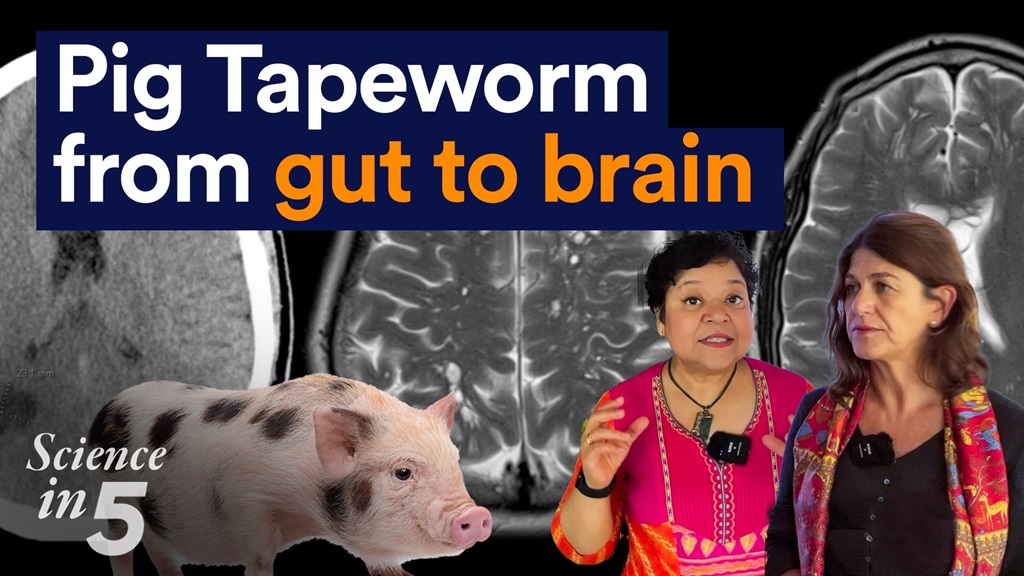Episode #145 – Pig tapeworm: from gut to brain
Alternative media
Related links
Transcript
VGS There is a tapeworm that uses humans and pigs as hosts. It hitchhikes in our gut, uses our food as nutrition, and is linked to seizures and epilepsy. It is called Taenia solium, or pig tapeworm. Now, having this worm in your gut is gross, but that's not the real threat. It is when we ingest the eggs of this parasite and the larvae hatch inside our body, they go rogue, they get lodged in our brain, becoming the most common preventable cause of epilepsy. Here to unpack this unsettling but important public health threat is Dr. Bernadette Abela. Welcome, Bernadette. So let's talk about this tapeworm. How exactly does it affect humans?
BA The tapeworm itself just lives in the gut with you. And doesn't really do very much. It is quite a few metres long, but most of the time, people don't even know that they're infected with a tapeworm. If people ingest the egg and the cysts develop, they usually develop in the brain, and these cause severe symptoms like seizures or epilepsy or headache. This is what is called neurocysticercosis. So up to 70% of all epilepsy cases in endemic areas where the parasite is present, is attributable to the pig tapeworm, and this means it is preventable. And also we don't have very good data, but 2.5 to eight million people are estimated to be affected with neurocysticercosis. So this problem is really a problem of bad hygiene and also bad food preparation practices.
VGS Wait, so how exactly do we ingest the eggs?
BA So if people don't wash their hands after defecation, if they are using dirty hands to prepare food and if untreated manure from human faeces is used, then eggs can survive and we can then ingest these eggs.
VGS So, wait, are you saying that vegetarians could also get infected with this tapeworm?
BA Yes, vegetarians and people who don't eat pork are able to get infected with Taenia solium because of contaminated vegetables or cooking utensils, for example.
VGS I remember when we were discussing the script, one of our experts, your colleagues, was also saying that they've seen vegetables stored in trains, in latrines, and that sounds like the perfect environment where they can get infected, right? So talk to us about, is there a treatment, for this?
BA There are treatments. One, it will depend whether it's the tapeworm that you're treating or the neurocysticercosis. The tapeworm can be diagnosed rather simply in primary health care facilities, and a specific dewormer can be used to remove the worm. So diagnosing neurocysticercosis is more complex. You need imaging. But already the symptoms can actually guide you to seek medical attention. If you have seizures, epilepsy, stroke, even headaches, then this might be a prompt for you to seek care. Treatment of neurocysticercosis would need to be guided by a specialized neurologist.
VGS And so how can we prevent this pig tapeworm and all of the havoc that it causes in our body?
BA So one principle way which would cut across many other health issues is good hygiene. Washing your hands after going to bathroom, washing your vegetables and using clean food preparation practices, and also avoiding use of untreated human manure. The other piece is really about building the awareness about this disease, the cycle, how it's transmitted, so people understand how they can prevent getting infected. The third is really very important. And that’s where you get infected with the tapeworm is cooking your pork and, of course, as I mentioned earlier, the treatment. Treatment of people is really important. It doesn't break the cycle. If we want to break the cycle, we would want to vaccinate the pigs and deworm them and this is in the principle of One Health. So we're taking action not only in the human, but in the animal and in the environment.
VGS Thank you, Bernadette. There you have it. Cook your pork well, wash the vegetables, wash your hands every time you use the washroom. And keep yourself safe from this really awful tapeworm. And it's not a small tapeworm, right?
BA No, many metres long.
VGS Many metres long. Which we will stop at that. Until next time then stay safe, stay healthy, and stick with science.



